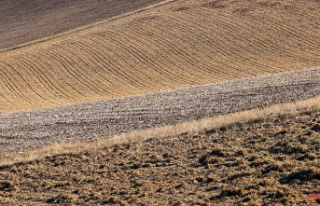The balance sheet of the German weather service proves it in black and white: The summer in North Rhine-Westphalia was far too hot and too dry. There were more hours of sunshine than ever before.
Essen (dpa / lnw) - Too warm, too dry and more hours of sunshine in North Rhine-Westphalia than ever before - the preliminary balance sheet of the German Weather Service (DWD) for the summer of 2022 is clear. As the DWD announced on Tuesday, there were 785 hours of sunshine in NRW this summer and thus more sun than ever since measurements began. This means that the number of hours of summer sunshine on the Rhine and Ruhr this year was well above the 554 hours of summer sunshine in the internationally valid reference period from 1961 to 1990.
Across Germany, the summer of 2022, with 820 hours of sunshine, also significantly exceeded its target of 614 hours (1961 to 1990). It clearly replaced the record summer of 2003 (793 hours of sunshine) and was thus the sunniest summer since data collection began. "The extremes of this summer can also be seen in our climate statistics. The summer of 2022 was the sunniest in Germany, the sixth driest and one of the four warmest since records began," summarized DWD press spokesman Uwe Kirsche. "In times of climate change, we should have experienced what will soon be a typical summer."
With 19.0 degrees (16.3 degrees in the reference period), 2022 was also one of the hottest summers in NRW and significantly warmer (plus 2.7 degrees) than the long-term average. With this value, NRW was only slightly below the national temperature average of 19.2 degrees. Compared to the current and warmer comparison period from 1991 to 2020, the deviation nationwide was plus 1.6 degrees. This means that the summer of 2022 is one of the four warmest in Germany since 1881. The summer of 2003 remained the "leader" with an average of 19.7 degrees in Germany.
In addition, there is also extreme drought in NRW. With 120 liters per square meter, it rained in Germany just half as much as in the reference period (240 liters per square meter). This is "terrifyingly dry", according to the DWD. NRW was thus almost at the level of the drought summer of 2018. With visible consequences for agriculture, forestry and inland waterway transport. Forest fires are a danger in many places, and poor harvests are causing some frustration.
Due to the lack of precipitation, low water became more and more of a problem over the course of the NRW summer. Most recently, there were record values at some measuring points on the rivers, especially the Rhine, some of which were even below those of 2018. The water level at the Emmerich gauge on the Lower Rhine fell briefly to a historic low of -1 centimeters by mid-August. The Rhine was largely drained except for the fairway. Shipping was massively impaired, many sections could only be navigated - if at all - with a smaller load. "In the third decade of August, however, there was a slight relaxation thanks to distant precipitation in the Alps on the Lower Rhine," said the DWD. Nevertheless, the water levels are still very low in many places at the end of August.
If you only look at August, according to the DWD in NRW it was the warmest with 20.5 degrees (16.6 degrees in the reference period) and with just over 15 liters per square meter (73 liters per square meter) area precipitation the driest August since the start of measurements. The sun shone in NRW for 280 hours (183 hours).












